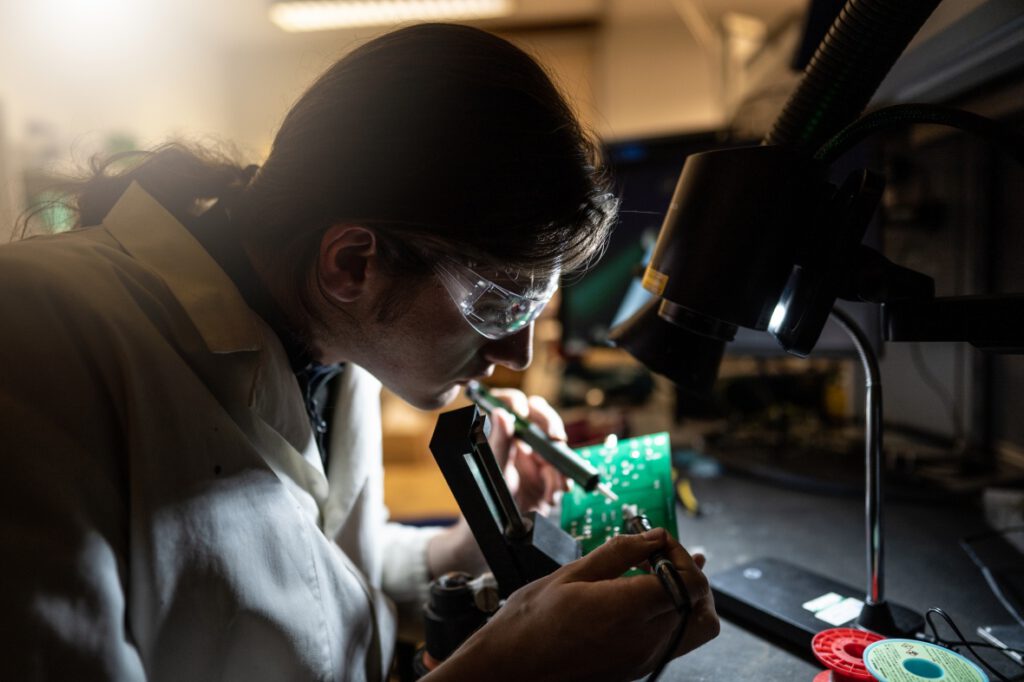“Elite skills development for everyone” offered through new University of Nottingham Electro-mechanical Engineering degree apprenticeship

A new Electro-mechanical Engineering degree apprenticeship launched by the University of Nottingham (@UniofNottingham) is set to transform the way firms attract recruits and upskill existing staff – and ultimately produce apprentices who can solve business-specific problems with both mechanical and electrical engineering expertise.
The degree apprenticeship, starting in September 2021, develops technical skills in design, testing and analysis and the soft skills that enable graduates to be effective members of an engineering team. Employer-specific project work is a major theme throughout the blended learning and block release programme, empowering apprentices to foster skills, knowledge and behaviours by solving engineering challenges that are unique to their place of work.
For employers, degree apprenticeships provide a cost-effective approach to workforce development, and businesses which have a wage bill over £3 million can fund the programme from their apprenticeship levy. Businesses with a wage bill under £3 million can still access this programme for their employees, and may be eligible for 95% government co-investment. It also means they can invest in the technical skills of staff who will be driving the innovation abilities of their organisation for years to come, and attract and retain top talent by giving employees the opportunity to gain a world-class degree without paying tuition fees.
“This is a brand new degree apprenticeship standard and we wanted to be quick out of the blocks offering it,” said Associate Professor and Programme Director, Dr Rowland Travis. “It is for anyone looking to develop core analytical skills in electro-mechanical engineering, including the fundamental mathematical techniques they will need to utilise, concepts of signals, analogue and digital systems, and later on in areas such as solid mechanics and dynamics, thermofluids, power and energy, electrical energy conversion, energy conditioning and energy sustainability. This expertise is sought after in industries spanning aerospace, energy and oil and gas, to mainstream engineering firms and equipment manufacturers. The transferability of skills acquired on this course will be a huge asset.”
With the University of Nottingham ranked second out of over 100 universities for electronic and electrical engineering in the Guardian University Guide 2021, employers are assured of access to high-quality training. Apprentices, who will be awarded a Level 6 Electro-mechanical Engineer apprenticeship certificate and a BEng (Hons) Electro-mechanical Engineering upon successful completion, will undertake an initial assessment to determine their existing level of skills and knowledge. The University will then build a personal plan for their learning. “The course is relevant for school leavers who are looking for on-the-job paid learning, as well as mid-career professionals seeking a skill-set top-up to support their career progression. It will fundamentally address issues around widening access to engineering careers, including those from non-traditional backgrounds,” Dr Travis added.
Adam Clare, Faculty Lead for Apprenticeships and Professor of Manufacturing Engineering at the University of Nottingham, said the Electro-mechanical Engineering degree apprenticeship would “deliver quality outcomes for employers”. He explained: “The challenge for many organisations is how to keep young people and train them to deliver value in their future. What the degree apprenticeship route offers is elite skills development for everyone, providing an attractive path to recruiting new staff and a way to upskill current employees whilst solving workplace specific challenges in the process. Apprentices will have the opportunity to study alongside engineers form other leading businesses, developing their own contacts.”
Many businesses, large and small, are already on board. Lynn Morris, Graduate/Apprentice Co-Ordinator at Siemens Gamesa Renewable Energy, said:
“Supporting an apprentice through the Electro-mechanical Engineering degree apprenticeship programme allows us to offer individuals an alternative route to obtaining a high level degree. We are able to offer the individual work experience, a salary and sponsorship for their degree. The main benefit to the company is that this bridges the gap between academic theory and practical skills learned in the workplace. The result is an individual who is work-ready with commercial awareness, high level workplace skills and a degree. Offering this type of apprenticeship we hope to attract enthusiastic, inquisitive students with a passion for renewable energy who might be looking for an alternative route to a bright career in engineering.”
Prospective apprentices should be working in a job role that provides opportunities to learn the skills, knowledge and behaviours outlined in the level 6 Electro-mechanical Engineer apprenticeship standard. This means they must:
- work a minimum of 50% of their time in England;
- be supported to undertaken 20% off-the-job training;
- hold a minimum grade 5 or above in GCSE English and Maths;
- and, be a UK/EU/EEA national or have lived and have had a right to work in the UK for three years or more.











Responses